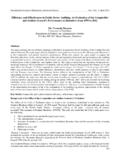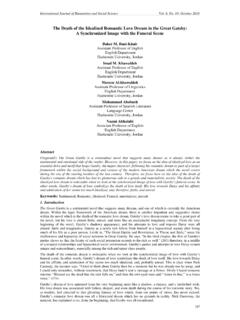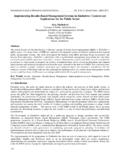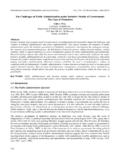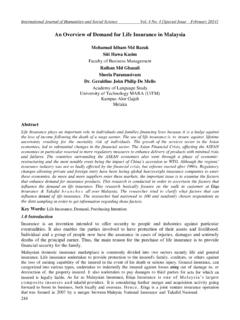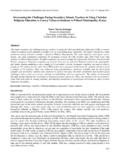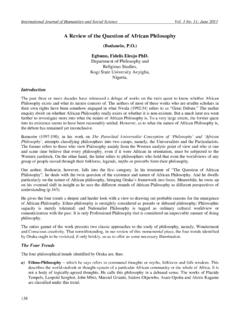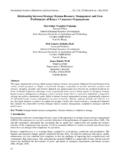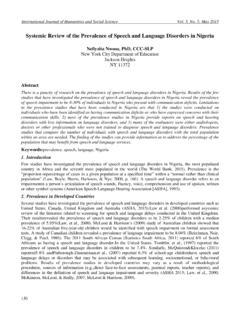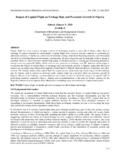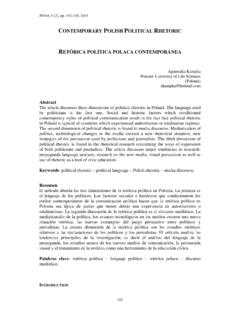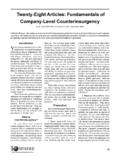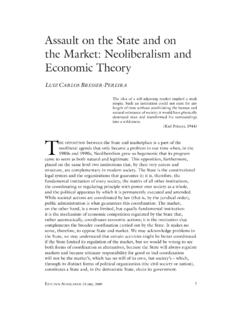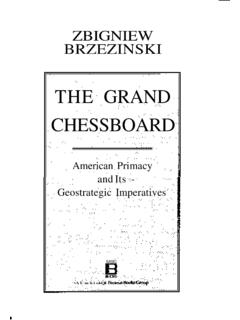Transcription of Weber’s Theory of Charismatic Leadership: The Case of ...
1 International Journal of Humanities and Social Science Vol. 5, No. 7; July 2015. Weber's Theory of Charismatic leadership : The Case of Muslim Leaders in Contemporary Indonesian Politics Dr. Jennifer L. Epley Assistant Professor Department of Social Sciences Texas A&M University-Corpus Christi 6300 Ocean Drive, Unit 5826, Corpus Christi, Texas United States of America 78412-5826. Abstract In Economy and Society, Max Weber created three models of legitimacy for the topic of political obligation and why one should obey the state: tradition, charisma, and legal-rational. The second model is personalistic and emphasizes the right and power of a special individual, which Weber identifies as charisma. This article explores the meaning and types of charisma by applying features of Weber's Theory of Charismatic leadership to Muslim leaders in contemporary Indonesian politics.
2 It offers an analysis of how Weber's notions might inform how we generally think about Muslim intellectuals, politicians or government officials, organization leaders, and scholars. In addition to its applications, this article identifies limitations of Weber's theories and potential areas in need of further research. Investigating the relationship between charisma and leadership in a specific country case can offer insights for clarifying certain political concepts and shaping future Theory - building, data collection, and testing. Keywords: Indonesia, Islam, leadership , political Theory , Weber 1. Introduction When political scientists explain political phenomena in Indonesia and elsewhere, they often use structural or institutional explanations and variables such as the party system, electoral configurations, regime types, or a state's economic position.
3 While these factors are important, the historical memory of the people does not usually record a particular electoral rule, judicial decision, or trade agreement as catalysts of change. Rather, it is leaders who guide, organize, mobilize, and generally influence life at the local, provincial, and national levels. This does not mean we should solely rely on the great man Theory of leadership in which great men make history and are the main or only causes of real, intended social change (Burns, 1978, p. 51). Leaders do in fact operate within structural and institutional contexts, but it can be useful to also have case studies about leadership if we want to understand human behavior and events more completely. In that vein, this article examines the application and limitations of Max Weber's Theory of Charismatic leadership for Muslim leaders in contemporary Indonesian politics.
4 2. leadership and Charisma leadership is a term that has numerous definitions and connotations. A leader may be defined by who he or she is (the personal) and by the responsibilities, obligations, and tasks he or she is charged with (the position). Leaders' authority can be great or limited and their legitimacy can rest on moral, rational, or practical foundations. Social psychologists distinguish between affective and instrumental leadership . Affective refers to maintaining a group and good relations among members, while instrumental deals with advancing a group in the performance of a common objective or task. Depending on the nature of the organization, leaders can be labeled as affective, instrumental, or both. leadership can be further classified as transactional such as opinion, group, party, legislative, or executive leadership or transforming like that of reform, revolutionary, heroic, or ideological leadership , terms that James MacGregor Burns includes in his book leadership (1978, pp.)
5 Vii-viii and 4). 7. ISSN 2220-8488 (Print), 2221-0989 (Online) Center for Promoting Ideas, USA One particular kind of leadership is Charismatic leadership . Like leadership in general, Charismatic leadership has a wide range of definitions, especially since charisma has varied meanings in different cultural and temporal settings. Setting aside normative judgments about whether a leader is good or bad, just or not, and moral or immoral, one might say that there is something about certain leaders that make them unique and exceptional. This something has been the subject of serious intellectual debates and Max Weber paved much of the way in terms of identifying this special something as charisma. His theories laid important groundwork for how we might think about and understand Charismatic leadership . When Max Weber explored the topic of political obligation and why one should obey the state in Economy and Society, which was published posthumously in 1922, he made contrary points to the traditional arguments of the time (1978).
6 He did not think self-interest (material, economic), fear (against punishment mostly), and habit or socialization were legitimate reasons for obeying the state. Weber instead believed that we obey because of validity, meaning that the state or authority is perceived to be good, right, or just. We evaluate the state as an order that is good and therefore obey, but we make such evaluations subjectively. In an effort to understand and classify these subjective approaches, Weber created three models of legitimacy: tradition, charisma, and legal- rational (1978). The first focuses on past behavior, which gives validity and meaning to the present laws and state. The second is personalistic and emphasizes the right and power of a special individual. The third points to instrumental rationality, which is choosing the appropriate means for particular ends while acting in accordance with utility.
7 It is in Chapter 14:Charisma and Its Transformations that Weber explicitly discusses the details of the second model. Weber begins his chapter on charisma with the following claim: All extraordinary needs, , those which transcend the sphere of everyday economic routines, have always been satisfied in an entirely heterogeneous manner: on a Charismatic basis It means the following: that the natural . leaders in moments of distress whether psychic, physical, economic, ethical, religious, or political were neither appointed officeholders nor professionals in the present-day sense ( , persons performing against compensation a profession based on training and special expertise), but rather the bearers of specific gifts of body and mind that were considered supernatural (in the sense that not everybody could have access to them).
8 (pp. 1111-1112). Charisma in this context is value-free, however. Weber was more concerned with whether leaders proved their charisma in the eyes of their adherents than value judgments (p. 1112). Weber continues his chapter by outlining the precise features of Charismatic leadership . He notes that charisma is often most evident in the religious realm, but not exclusively found there (p. 1112). Charisma knows no formal and regulated appointment or dismissal, no career, advancement, or salary, no supervisory or appeals body, no local or purely technical jurisdiction, and no permanent institutions in the manner of bureaucratic agencies (p. 1112). Furthermore, charisma is a highly individual quality (p. 1113). Robert Tucker adds that in Weber's usage, the possessor of Charismatic authority, who may be a religious, political, military, or other kind of leader, is in essence a savior- leader or one perceived as such (1977, p.)
9 388). Tucker explains that a leader who comes forward in a distressful situation and presents himself or herself in a convincing way to the sufferers as one who can lead them out of their distress by virtue of special personal characteristics or formula for salvation may arouse their intense loyalty and enthusiastic willingness to take the path the leader is pointing out (p. 388). Furthermore, Charismatic leadership carries potential hazards as well as benefits depending on the time, place, and what means and ends are involved (p. 388). This is because for Weber, the Charismatic leader goes against tradition, generates new things, and changes points of reference or frameworks, but can also be subversive, irrational, and unstable. In addition, there is a focus on the present moment. Charismatic leadership therefore carries within itself its own demise for it cannot last forever.
10 There are eventually problems with the routinization and succession of charisma. In order to understand Charismatic leadership more fully beyond what has been presented so far, particularly with regard to its appeal and limitations, the next section delves more deeply into the psychological, social, and relational dimensions of Charismatic leadership . 3. The Psychological, Social, and Relational Dimensions of Charismatic leadership Interpretations and criticisms of Weber's work on Charismatic leadership come in a multitude of forms. Praise, rejection, or changes to his theories depend on the extent to which one agrees or disagrees with how Weber understood the psychological, social, and relational dimensions of Charismatic leadership . 8. International Journal of Humanities and Social Science Vol. 5, No.
